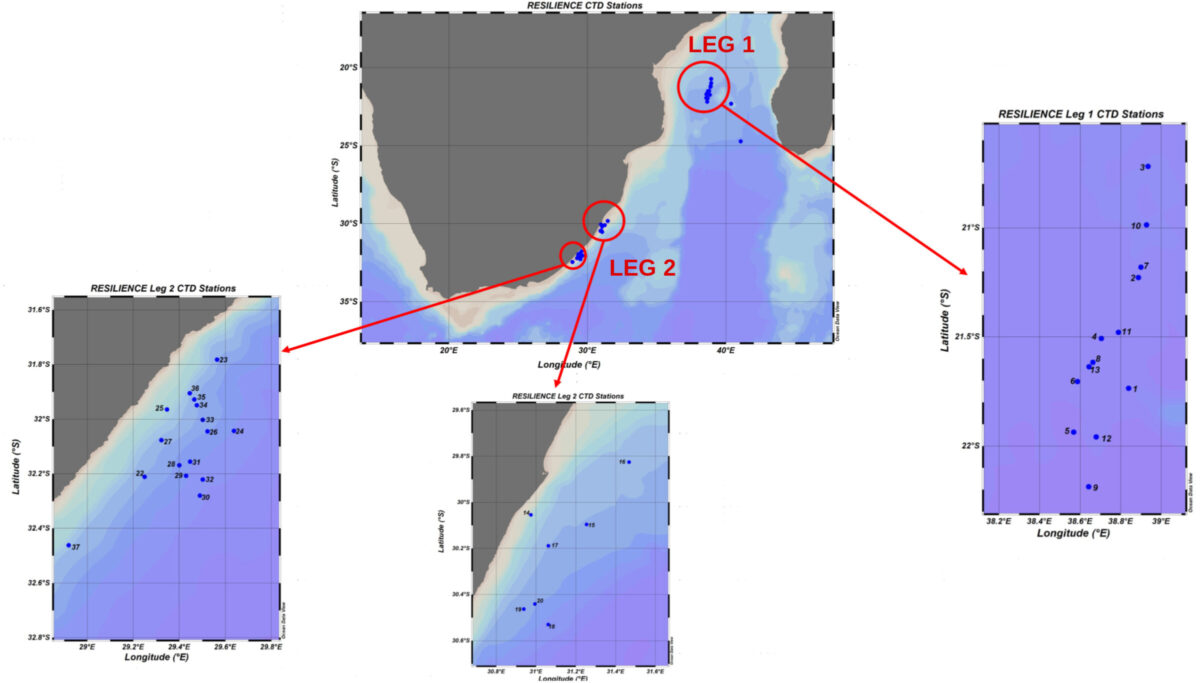Oceanographic cruise RESILIENCE 2022

Marion Dufresne | April – May 2022 | Mozambique Channel and eastern South African continental shelf (Indian Ocean)

The RESILIENCE oceanographic campaign took place between April 19th and May 22nd 2022 in the Indian Ocean on board the Marion Dufresne, a mythical ship of the French Oceanographic Fleet. About 50 international scientists led by Jean-François Ternon, IRD researcher at the UMR MARBEC (MARine Biodiversity, Exploitation and Conservation), embarked for 35 days to better understand the interactions between physics and biology at “small scale” (~10km) in the particular ocean structures of the Mozambique Channel.
Progress of the mission
Mission completed
Arrival at Reunion Island on May 22nd, 2022
Ship’s position
The last news
Objective of the mission
Understand the role of eddies in biological productivity and ecosystem structuring at small scales. The main objective of the RESILIENCE oceanographic cruise is to study the physical-biological interactions at small scales (~1-10 km), especially on the fronts and filaments associated to mesoscale eddies (~100km) in the Mozambique Channel. The goal of the mission is to understand the role of physical processes (vertical exchanges in particular) on a small scale – well described by modeling but difficult to observe at sea – on biological productivity and the structuring of pelagic ecosystems up to top predators.
In the context of climate change, it is predicted that the intensity of these fronts will vary in the future with possible consequences on these ecosystems. The results of the campaign will therefore contribute to a study of the consequences of these changes on the exploited ecosystems of the area.
The geographical area sampled is the central Mozambique Channel and the east coast of South Africa. We encounter marked eddy structures, in contrasting hydrodynamic contexts. The eddies studied being by nature mobile structures, the sampling plan is permanently adapted by a real time analysis of satellite data (altimetry and ocean color).

Find out more about the objectives and process of the two Leg:
Floating University
The oceanographic cruise hosts a Floating University, a framework for students to engage in scientific activities on board and to manage communication on board and to the public.
The twenty or so happy master’s students come from the Université Bretagne Occidentale, Université Littoral Côte d’Opale, Université Côte d’Azur (France), and Nelson Mandela University (South Africa). They are supervised by Christophe Mocquet (Université Côte d’Azur) and Sara Sergi (Université de Bretagne Occidentale). The participating French universities are members of the Réseau des Universités Marines.
The objective is to offer students from various disciplines involved in the research conducted in the RESILIENCE campaign (chemistry, biology, marine ecology or conservation sciences) the chance to live a full-scale scientific experience, as close as possible to the researchers, by benefiting from their respective expertise and by accompanying them on a daily basis in this experience at sea.
In addition to the active participation in the scientific activities on board, the students ensure a good part of the communication on board and to the general public, via the organization of scientific seminars, daily restitution of the activities on board, syntheses on the methods, the tools used and the jobs on board. These products are used to provide different media (website, posters, Twitter, Instagram) to enhance this experience shared at sea with the largest number of people.
Instagram
@uf_resilience
Twitter
@uf_resilience
Press review
Key partners

Other partners

Founders

The campaign is partially funded by the Belmont Forum’s Ocean Front Change program. Other sources of funding are currently the LEFE (CNRS) and ISblue (IUEM) programs, the French Oceanographic Fleet, and the National Research Foundation (NRF) in South Africa.
Contacts
- Floating University on the RESILIENCE cruise: christophe.mocquet@univ-cotedazur.fr
- Communication IRD, Occitania Regional Delegation | Julie Sansoulet
- Communication UBO, Interdisciplinary Graduate School ISblue | Laure de Montbron
- Researchers IRD, France | Jean-François Ternon
- Press review
© Website created on board the Marion Dufresne by Christophe Mocquet (Université Côte d’Azur) and Sara Sergi (Université de Bretagne Occidentale), with contributions from students of the Université Flottante and scientists on board thanks to the technical support of Laure de Montbron and Simon Le Grel (ISblue).
 Attention, vous utilisez un navigateur peu sûr !
Attention, vous utilisez un navigateur peu sûr !